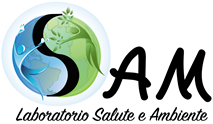Laboratory Health and Environment

The Laboratory of Health and Environment (SAM) focuses on the interaction between the environment and the biological systems, to characterize its impact on human health in terms of predisposition to and prevention of chronic diseases development and aging.
In particular, the lab deals with the following environmental factors:
- physical agents: ionizing and non-ionizing radiations, including extremely low frequency magnetic fields arising from occupational and environmental devices exposure, and communication systems-derived radiofrequencies (such as wifi, cell-phones, 5G);
- chemical agents: air pollutions, emerging contaminants such as endocrine disruptors, nano-plastics, nanomaterials;
- functional foods, nutraceuticals and natural biomolecules.
The laboratory is based on a multidisciplinary team, where the expertise of biologists, engineers and epidemiologists converges to characterize the impact of the environment on human health by multiple points of view and experimental approaches. In particular we take advantage of different in vivo, in vitro (both 2D and 3D systems) and in silico (molecular dynamics) experimental systems to study the interaction between the environmental hits and the biological systems.
Many different cellular and mouse models and an epidemiological database, available within the Health Protection Technology Division, are exploited to achieve the following research goals:
- i) identification of the basal cellular and molecular mechanisms underlying the environment/cell interaction, with a particular focus on epigenetic regulation (mainly DNA methylation analysis and small non-coding RNAs pathways). We integrate innovative epigenetic analyses with the assessment of genotoxicity (DNA damage, gene mutations, cytogenetic aberrations) and oxidative stress-related endpoints;
- ii) identification of early biomarkers of exposure to environmental pollutants;
- iii) hazard characterization of emerging pollutants;
- iv) development of innovative, cost-effective biomarkers to be applied in case of chemical, biological or radiological emergencies;
- v) health impact and risk assessment estimation from environmental pollution, in the framework of sustainable development strategies;
- vi) comprehension of the effects triggered by functional foods, nutrients and natural bio-molecules on human health, with a particular eye on nutrigenomics and nutri-epigenomics as a new frontier to understand the multi-level effect of nutrition in the prevention of diseases and promotion of healthy aging;
- vii) in a contest of “green-economy”, we are interested in the valorization of biomolecules derived from bio-products of the agro-food production chains and wastes, for their exploitation in disease prevention and/or promotion of healthy aging.
As future perspectives, we are interested in characterizing innovative molecular biomarkers for testing cell response to environmental stressors, in exploring the potential of active biomolecules in the field of the cosmeceutics, and in developing new in vitro experimental systems, like innovative 3D or bio-printing systems, that might provide reliable alternative to the in-vivo models.
Research topics
Projects
Status: ongoing
-
Regeneration of injured spinal cord by electro pulsed bio-hybrid approach
Status: Completed
-
Analisi in vitro per la valutazione dell’effetto ipoglicemizzante di matrici vegetali a base di estratti di arancia, limone e vite
-
Nutraceutici da matrici vegetali del bacino mediterraneo
-
Studio integrato dell’esposizione dei lavoratori al particolato atmosferico in ambienti indoor: simulazione numerico-sperimentale di campi fluidodinamici e di concentrazione, in scala reale e di laboratorio; caratterizzazione chimica, morfologica e tossicologica del particolato fine ed ultrafine
-
Studio dell'attività biologica di matrici vegetali del bacino mediterraneo
-
Novel biological and physical methods for triage in radiological and nuclear (R/N) emergencies
-
Accordo di Cooperazione in materia di produzione dei biocombustibili e loro utilizzo nel settore dell'aviazione
-
In vivo toxicity and genotoxicity of beauvericin and enniatins
-
ON-SITE TECHNICAL ASSISTANCE TO THE CHEMICAL, BIOLOGICAL, RADIOLOGICAL AND NUCLEAR CENTRES OF EXCELLENCE SECRETARIATS IN GEORGIA, KENYA AND MOROCCO
-
A PANEL OF BIOMARKERS AS NOVEL TOOL FOR EARLY DETECTION OF RADIATION EXPOSURE
